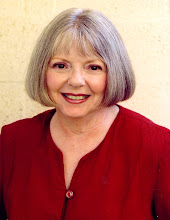Poisoned Pen’s Malice Abroad took place Saturday, July 15, 2007, and featured Rhys Bowen, Aaron Elkins, Sharon Kay Penman, Nicole Mones, Alan Gordon, Jon Talton, Carol Goodman, and the always superb Barbara Peters, who organized the conference.
Although not billed as a writers’ conference, the authors at Malice Abroad jammed so many great writing tips into their talks that any in attendance who didn’t take notes missed some great advice.
For instance, while being interviewed by Barbara Peters, editor in chief of the Poisoned Pen Press, Carol Goodman, author of “The Sonnet Lover,” set in Italy, said, “Although I’ve traveled in Italy quite a bit and even spent an entire week in a villa like the one in my book, I still made up a fictional place -- just in case. My advice to anyone setting a novel in a city they don’t live is to describe only a couple of places, such as a church, in detail. That will give the reader the flavor of the area, without the author taking too big a chance to screw up.” Other books by Goodman include “The Ghost Orchid” and “The Lake of Dead Languages.”
Although Alan Gordon’s books are set in medieval France (“The Lark’s Lament,” “Thirteenth Night,” etc.), and he travels there frequently, he confided that an author doesn’t really need to travel the globe to come up with a book. “My neighborhood of Queens, New York, is one of the most ethnically diverse neighborhoods in the world, and a lot of my ideas actually begin there. Then I just transplant that nugget of an idea to the south of France. And the 13th century!”
Jon Talton sets all his novels (“Concrete Desert,” “Cactus Heart,” etc.) in his home town of Phoenix, because as he said, “That’s where the corruption is. In the desert, those who control the water control society. Talk about motives for murder!” Talton, also an acclaimed journalist, then warned, “I’m growing increasingly alarmed by people who brag that they don’t read newspapers any more, that they get everything they need from the Internet. But I can assure you that the people who run this country do read the newspapers, because that’s where the issues are discussed in depth by experts, the people who actually know what they’re talking about. Are we going to allow only our rulers to be fully informed?”
Not surprisingly, that common writer’s affliction -- the Dark Night of the Soul -- came up more than once during the conference. Nicole Mones, who sets her books in China (“Lost in Translation,” “The Last Chinese Chef,” etc.), talked about the writer’s loneliness. “The time between books can be very dark because you don’t know if you’ll ever get published again. I was in a particularly dark time when I got an email from Barbara Peters asking me, ‘Are you still writing? I’m looking forward to reading one of your books again!’ That made all the difference in the world to me.”
But the conference wasn’t just about the Dark Side. Sharon Kay Penman (“Prince of Darkness," “The Queen’s Man,” etc.) got a few laughs when she said, “Being a writer is great, because you can play God in your books. Whenever someone gives you a hard time, you can just kill them.”
Peters laughed, then said, “Mystery writers are always going around in public talking to themselves, so I’m always waiting for one of them to be hauled off by the guys with nets. Especially since those mutters are usually about various ways to kill people without getting caught.”
Aaron Elkins, who’s traveled all over the world to research the settings in his books (“Little Tiny Teeth,” “Unnatural Selection,” etc.), said, “Well, mystery writing can be a dangerous profession in many ways. Your characters take over your life, and if you’re not careful, they can get you killed. For instance, when I was going down the Amazon, I actually encountered that big spider I used in ‘Little Tiny Teeth.’”
The high point of the eight-hour conference (besides the authors, of course) was the hat contest judged by Rhys Bowen (“Her Royal Spyness,” “In Dublin’s Fair City,” “Evanly Bodies,” etc.) just after tea. But amidst the applause and laughter, Bowen offered some advice of her own. “It sometimes helps develop a character if you can keep her as close to yourself as possible. For instance, in my new series about Lady Victoria Georgiana Charlotte Eugenie, many of the things that happen to Georgie actually happened to me. Therefore I was able to use some of my own observations about the English class system. And it’s not pretty.”
Tuesday, July 17, 2007
Subscribe to:
Post Comments (Atom)










No comments:
Post a Comment